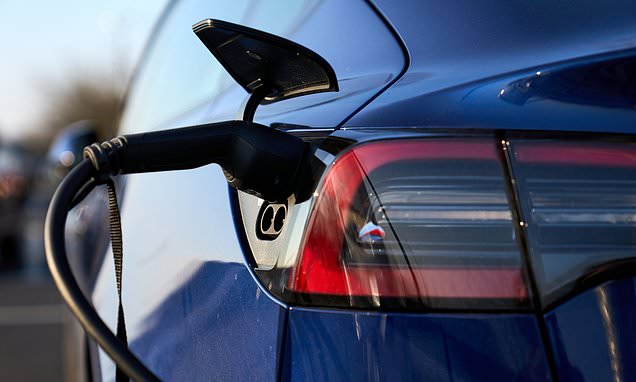
By Leah Montebello For The Daily Mail
22:05 01 Mar 2023, updated 22:05 01 Mar 2023
The UK is struggling to keep up with the US and Europe in the race to become an electric vehicle powerhouse, industry experts have warned.
A string of problems – from a lack of charging points to the collapse of plans to build a £3.8billion car battery gigafactory –have highlighted a lack of investment in the green revolution.
Such is the level of concern that Britain has now been accused of being ‘asleep at the wheel’, particularly in light of government plans to outlaw the sale of new petrol and diesel cars in 2030.
And in a stark warning to ministers, former Aston Martin chief and ‘godfather of the EV’ Andy Palmer declared: ‘There are going to be winners and losers.’
The comments came after the owners of Jaguar Land Rover (JLR) demanded more than £500million of aid to build a battery factory in Britain rather than Spain.
JLR’s Indian parent Tata Motors has given ministers just weeks to pledge financial support to secure the investment in Somerset or see it choose a major European rival, according to the Financial Times.
The aid would include grants and support packages such as assistance for energy costs and research, reigniting hopes that Britain could play a major role in building cars, pivoting away from petrol and diesel towards electric vehicles (EV).
Although Tata has refused to comment, a government official said: ‘We are engaging with them – whether or not the talks go anywhere depends on whether a final amount can be agreed.’
Related Articles
HOW THIS IS MONEY CAN HELP
If Tata opts for Spain, it would be another bruising setback for the British car industry, which last year saw production slump to its lowest level since the 1950s. While some may disagree with Tata’s tactics, Palmer said the demands were reasonable.
He told the BBC Today programme: ‘If the UK wants to continue with a car industry it is going to need to compete both with the US and the EU in terms of those incentive packages.’
While the US has introduced an inflation reduction scheme, which has made it increasingly attractive for car makers to manufacture EV batteries there, Europe has made it a strategic mission to pump money into electric motors via its European Battery Alliance.
Spain has been offering hefty grants to firms considering battery production and has some of the lowest energy and electricity costs in Europe. This makes it a fierce rival for the affections of Tata, Britain’s biggest car maker.
Although the Government has handed out more than £100million to Nissan for its Sunderland factory and £30million to Stellantis to make electric vans in Ellesmere Port, experts say it needs to do more to keep the sector alive.
David Henig, director at the UK trade policy project at the European Centre for International Political Economy, said: ‘It feels as if the UK is asleep at the wheel when it comes to its EV strategy.’
Although he told the Mail he was concerned by Tata’s ‘give us your money or we’ll leave tactics’, he feared the Government’s car manufacturing policies were lacking confidence.
Likewise, Professor David Bailey, a car industry expert at Birmingham University’s business school, said the UK was ‘sitting on the sidelines’.
To make matters worse, the rescue of Britishvolt, once seen as the future of the industry, was dubbed a ‘wasted opportunity’ after it emerged that its Australian buyer, Recharge Industries, plans to focus on energy storage and then luxury sportscar batteries rather than the mass market car industry.
Bailey said that the change in direction for Britishvolt was a ‘disappointment’.
‘If they end up buying the site and doing energy storage that is a bit of a wasted opportunity, because it’s ideal for a gigafactory,’ he said.
The plan was to build a £3.8billion gigafactory that would make 300,000 batteries a year for UK-made electric cars.
And the situation isn’t much better for electric cars that have already been made.
A recent poll by the AA revealed an EV charging crisis.
It found that just one in 50 drivers use electric vehicles.
Nearly three-quarters want to switch, with almost 2m planning to within two years.
But AA president Edmund King said many will not because of the lack of charging points and called on the Government to expand their availability.
Fewer than 9,000 public electric charging devices were installed last year and nearly a third of are in London, with Westminster alone having more than Liverpool, Manchester, Newcastle, Leeds, Sheffield and Birmingham combined.
So, whatever the Government decides to do with Tata, the reality is that the UK needs to up its game when it comes to electric – or accept that it will simply get left behind.
Some links in this article may be affiliate links. If you click on them we may earn a small commission. That helps us fund This Is Money, and keep it free to use. We do not write articles to promote products. We do not allow any commercial relationship to affect our editorial independence.






